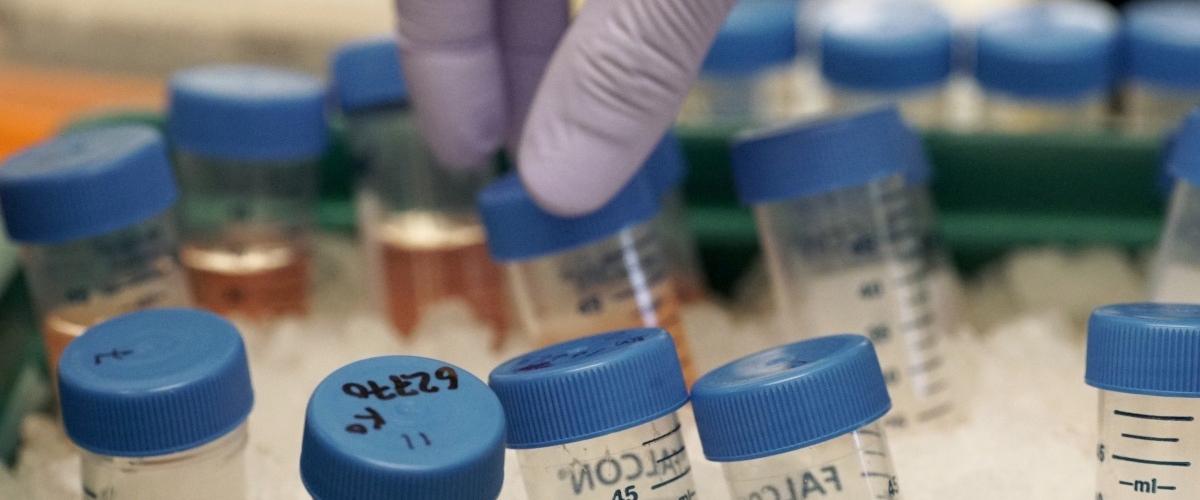
The Duke Division of Endocrinology, Metabolism, and Nutrition is involved in a number of basic science research programs that further the understanding of diabetes, endocrine disorders, metabolism, and nutrition.
Christopher Newgard, PhD, David and Sarah W. Stedman Distinguished Professor of Pharmacology and Cancer Biology and Medicine, and Director of the Duke Molecular Physiology Institute and the Sarah W. Stedman Nutrition and Metabolism Center. Dr. Newgard's research focuses on application of an interdisciplinary approach to gain mechanistic understanding of complex cardiometabolic diseases. This interdisciplinary approach includes gene discovery, metabolic engineering, and comprehensive tools of metabolic analysis ("metabolomics") such as mass spectrometry-based metabolic profiling.
Deborah Muoio, PhD, Associate Professor of Medicine and Pharmacology and Cancer Biology, and Director of Basic Research at the Duke Molecular Physiology Institute. Her laboratory studies molecular events that link nutrition and exercise to health outcomes, with emphasis on mechanisms regulating metabolic control and mitochondrial bioenergetics in skeletal muscle and heart. Her research program features a translational approach that combines basic science and human studies with mass spectrometry-based metabolomics and proteomics to identify molecular signatures of mitochondrial dysfunction and cardiometabolic disease. The overarching goal of this work is to guide the development of new lifestyle, nutraceutical and/or pharmacological strategies to maintain mitochondrial and metabolic health. Read more.
Matthew Hirschey, PhD, Associate Professor of Medicine and Pharmacology and Cancer Biology. The Hirschey Lab in the Duke Molecular Physiology Institute, and the Departments of Medicine and Pharmacology & Cancer Biology at Duke University studies different aspects of metabolic control, mitochondrial signaling, and cellular processes regulating human health and disease. The central theme of the laboratory is to understand how cells use metabolites and chemical modifications to regulate metabolism. One of the primary goals is to expand our understanding of metabolic regulation by post-translational modifications of proteins. He and his lab study the regulation of this process by a family of enzymes called sirtuins, and how they maintain energy homeostasis. Another major effort is to understand the mechanisms leading to lysine acylation (referring to multiple ‘acyl’ groups on proteins), the overlap with protein acetylation, and how this system influences cellular function. Metabolic regulation is important for several physiological states and disease processes, including diabetes, cardiovascular disease, cancer, and the aging process. Read more.
Jonathan Campbell, PhD, Assistant Professor of Medicine and Assistant Research Professor of Pharmacology and Cancer Biology. The Campbell lab is interested in the role of hormones produced in the pancreas, gastrointestinal tract and brain to regulate glucose and energy metabolism. The central research approaches use a combination of mouse genetics, physiology, pharmacology, and molecular biology to understand how these hormones independently and cooperatively impact the biological functions of beta cells, alpha cells, and adipocytes. The ultimate goal of this research is to identify novel targets for the development of new therapeutics for the treatment of obesity and diabetes.
Hans Hohmeier, MD, PhD, Assistant Professor of Medicine. Dr. Hohmeier is focused on factors that control function and viability of mature islet beta-cells and how these factors can be exploited to prevent the loss of beta-cell mass and function in diabetes. Recently, he and his group have successfully identified transcription factors that increase proliferation and function of mature beta-cells. As they continue to investigate how these transcription factors and some of their target genes enhance beta-cell function, increase beta-cell proliferation and provide protection against beta-cell stressors, he and his group hope to discover target genes that can be further developed for the treatment of diabetes.
Paul Grimsrud, PhD, Senior Research Scientist. Dr. Grimsrud serves as section leader for the DMPI proteomics program. His research leverages mass spectrometry-based proteomics and metabolomics to understand molecular mechanisms of metabolic control. Current projects are focused on the development and application of quantitative proteomics methods for studying the dynamics of post-translational modifications (e.g., phosphorylation, acylation, carbonylation) in response to physiologic and genetic manipulations. Together with collaborating laboratories in the DMPI, these efforts seek to identify novel regulatory mechanisms that influence metabolic homeostasis in health and disease.
Guofang Zhang, PhD, Assistant Professor of Medicine. Dr. Zhang is interested in cardiac metabolism, especially the perturbation of energy metabolism in the diseased heart, such as from ischemia/reperfusion injury and diabetes. With the combination of metabolomics and stable isotopomer analysis, he and his colleagues study metabolic flux changes and dys-coordination between mitochondria and peroxisomes on fatty acid oxidation in diseased hearts.
Phillip White, PhD, Assistant Professor of Medicine and Assistant Research Professor of Pharmacology and Cancer Biology. Phillip Co-directs the White-McGarrah Lab at the Duke Molecular Physiology Institute with Rob McGarrah, M.D. from the division of Cardiology. The White-McGarrah lab studies the molecular networks involved in cardiometabolic disease pathogenesis with an emphasis on defining mechanisms responsible for perturbations in glucose, lipid, and amino acid homeostasis in diabetes, non-alcoholic liver disease (NAFLD) and heart failure. We are particularly interested in defining mechanisms of heart-liver crosstalk in heart failure pathogenesis. Read more about Dr. White's research.